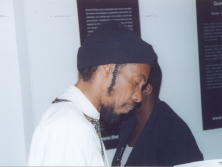Y42K
A Review of the SpokenWord Cd with music
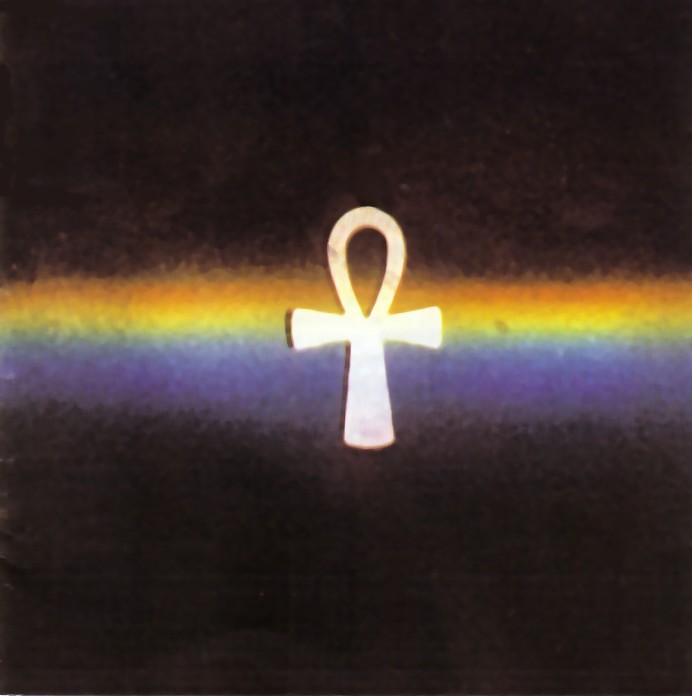
Roi Kwabena has taken his performance poetry to another
level on his recently published CD, Y42K. This is a technological advance
from his first chapbook of poems published when he was eighteen years old,
many years ago. His journey has been long and wide-ranging: from Christian
to Black activist, from Muslim to conventional politics, where he became a
senator in his country’s opposition. He is a world traveller as well, and
an excellent survivalist.
The poems should relate to a Trinidadian audience or to the Caribbean diaspora in Britain and elsewhere. The fourteen performance pieces seem to hinge upon the persona’s wish to alleviate the evils and negativity of his society.
The sequence begins with the obeahman theme (and title) and thirteen pieces later concludes with a reprise of the same theme and title to end the cycle.
Between the introduction and the reprise the pieces explore contemporary situations in Trinidad and Tobago. ‘Hang’ treats the capital punishment issue around the time that nine convicts were executed over three days. The poet prefers instead that all the other ills and evils of under-development and under-developed societies should ‘hang’ instead. This theme and approach informs the whole presentation.
The approach to form in the set is universally pregnant with cataloguing and repetition. Perhaps it is unavoidable in a rapso genre, which is based on the ethnic call, response and echoing format.
The drumming, steelpan, and other instruments, which provide the musical framework, complement, as well as compliment, the performance. They often add a piquancy to the pieces that satisfies a fellow tribalist. The ensemble, including the poet, Kwabena, works well and creatively, within their limitation, and supply music appropriate to the focus of the poems. They create mood and atmosphere, whether the focus is on obeah, the First Nations (Amerindian) influences as in ’cacique’, the East Indian influences as in ‘Sour Chutney’, the African influence as in ‘el niyl’, and the Trinidadian influences throughout.
With the end of the year approaching, I can see ‘cascadura’ catching on as an alternative to ‘Auld Lang Syne’ for Trinidadians everywhere. There is an old legend, mostly forgotten now, that those who eat the Trinidadian mudfish, the cascadura, must return to Trinidad to die. It was the theme of a well-known 1930s poet, Allister Macmillan, and was also the theme of a Samuel Selvon novel, Those Who Eat the Cascadura. Kwabena has done an excellent job in providing this piece of nostalgia for his audience.
This genre does not provide much opportunity for felicitous imagery, but two pieces of creativity struck me. In ‘sour chutney’ which treats with indentureship and its aftermath, the poet chants about "sugar cane fields bleeding molasses", which is quite a pithy image. In ‘whether or not’ there is, as well, "the sting has left the nettle".
In ‘cascadura’ also, there is a surprise injunction the "No one supports stealing leatherback turtles’ eggs." This highlights a serious conservation problem in Trinidad, and its introduction must have been deliberate.
‘Y42K’ did not have, for me, the impact expected of a title poem; it deals with time, one of the perennial concerns of poetry. It also concerns a phonetic, dialect question, and a celebration of a significant year in the poet’s life. ‘Triangle’ is interesting though it doesn’t work quite well in this treatment, but I acknowledge the difficulty of the genre which forces one to adopt a haranguing tone for most of the issues. How to produce a perfectly sculpted poem that contains protest, didacticism and music will always be a problem, especially for those who try to take the form forward.
Roi Kwabena is to be commended on his almost pioneering presentation, which harvests his consciousness and handles his art in a creditable manner.
Anson Gonzalez
Diego Martin, Republic of Trinidad & Tobago, Caribbean
The poems should relate to a Trinidadian audience or to the Caribbean diaspora in Britain and elsewhere. The fourteen performance pieces seem to hinge upon the persona’s wish to alleviate the evils and negativity of his society.
The sequence begins with the obeahman theme (and title) and thirteen pieces later concludes with a reprise of the same theme and title to end the cycle.
Between the introduction and the reprise the pieces explore contemporary situations in Trinidad and Tobago. ‘Hang’ treats the capital punishment issue around the time that nine convicts were executed over three days. The poet prefers instead that all the other ills and evils of under-development and under-developed societies should ‘hang’ instead. This theme and approach informs the whole presentation.
The approach to form in the set is universally pregnant with cataloguing and repetition. Perhaps it is unavoidable in a rapso genre, which is based on the ethnic call, response and echoing format.
The drumming, steelpan, and other instruments, which provide the musical framework, complement, as well as compliment, the performance. They often add a piquancy to the pieces that satisfies a fellow tribalist. The ensemble, including the poet, Kwabena, works well and creatively, within their limitation, and supply music appropriate to the focus of the poems. They create mood and atmosphere, whether the focus is on obeah, the First Nations (Amerindian) influences as in ’cacique’, the East Indian influences as in ‘Sour Chutney’, the African influence as in ‘el niyl’, and the Trinidadian influences throughout.
With the end of the year approaching, I can see ‘cascadura’ catching on as an alternative to ‘Auld Lang Syne’ for Trinidadians everywhere. There is an old legend, mostly forgotten now, that those who eat the Trinidadian mudfish, the cascadura, must return to Trinidad to die. It was the theme of a well-known 1930s poet, Allister Macmillan, and was also the theme of a Samuel Selvon novel, Those Who Eat the Cascadura. Kwabena has done an excellent job in providing this piece of nostalgia for his audience.
This genre does not provide much opportunity for felicitous imagery, but two pieces of creativity struck me. In ‘sour chutney’ which treats with indentureship and its aftermath, the poet chants about "sugar cane fields bleeding molasses", which is quite a pithy image. In ‘whether or not’ there is, as well, "the sting has left the nettle".
In ‘cascadura’ also, there is a surprise injunction the "No one supports stealing leatherback turtles’ eggs." This highlights a serious conservation problem in Trinidad, and its introduction must have been deliberate.
‘Y42K’ did not have, for me, the impact expected of a title poem; it deals with time, one of the perennial concerns of poetry. It also concerns a phonetic, dialect question, and a celebration of a significant year in the poet’s life. ‘Triangle’ is interesting though it doesn’t work quite well in this treatment, but I acknowledge the difficulty of the genre which forces one to adopt a haranguing tone for most of the issues. How to produce a perfectly sculpted poem that contains protest, didacticism and music will always be a problem, especially for those who try to take the form forward.
Roi Kwabena is to be commended on his almost pioneering presentation, which harvests his consciousness and handles his art in a creditable manner.
Y42K is produced by Kwabena’s Bembe Productions,
1999.
Anson Gonzalez
Diego Martin, Republic of Trinidad & Tobago, Caribbean
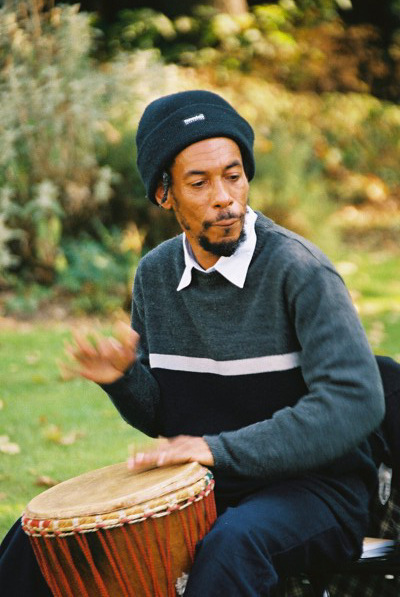 ======================
======================
WHETHER OR NOT
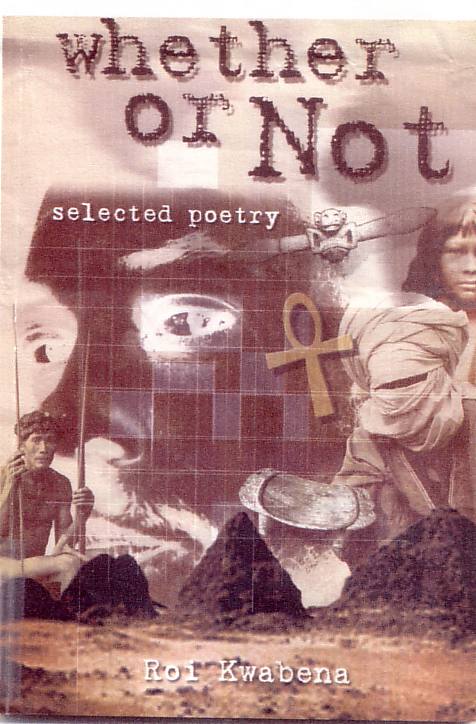
new poetry
Roi Kwabena.
Being a relative newcomer to the prodigious output of the Poet
and Essayist Roi Kwabena, I can only say, if his recently published selected
poems, “whether or Not” is anything to go by, the loss has been all mine.
“Whether or Not” opens like a cultural salvo, across the bows of conventional
Caribbean poetry, it is challenging, vibrant and refreshing. His is an unapologetic
Trinidadian voice, A Shaman, Obeah ? man, toying with you, singing to you
and dancing with you. This is a Poet, whose pride in his multi-cultural heritage
and belief in the power and beauty of his language takes you on a journey
of discovery and rediscovery.
Drawing deeply on his Afro-Trinidadian roots, Roi Kwabena evokes the spirit
of folklore characters, calypso rhythms, old sayings and Shango, juxtaposed
with environmental, social and universal injustices, to weave his spell.
Each poem is like an individual world, self-sufficient in it’s structural
and emotional content, from the wide span of his historic references to the
subtle, microscopic emotions of his inner self, answerable to no one.
At times, using multi-faceted, jazzy word play, invoking images of childhood,
games played, fruits eaten, words overheard, Roi Kwabena lulls you into a
golden nostalgia, only to awaken you with his lyrical compassion for the
victims of political and spiritual corruption.
Striding in the footsteps of illustrious Caribbean Poets, like Ceazire, Walcott,
Brathwaite and Harris, with “whether or not” Roi Kwabeana succeeds in filling
them, by bridging the old with the new, by opening your eyes to the magic
of his imagination and your spirit to the music of his soul and has certainly
established himself as the voice of new Caribbean Poetry.
Mustapha Matura.
2001-11-23
Veteran writer reviews "Whether or not"
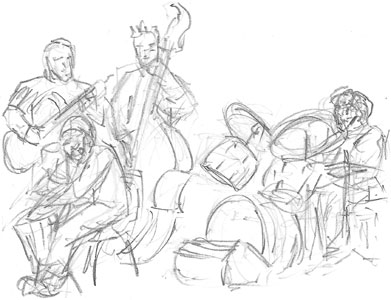
WHETHER OR NOT
A Review BY LENNOX RAPHAEL
Roi Kwabena's is celebratory poetry. He celebrates not only himself and the spirit of the time, the joy of being now & alive to the pulsating rhythm of the imagination, he salutes 'geographical' wonders & emotions, places & feelings that evoke/provoke memory in new ways of seeing the familiar. His is also a lyricism of re-naming, re-claiming, valorizing, putting the common-place in a proper ( and literary) perspective; the true baptism.
look,
take back these identities
you gave my wind-swept
volcanic rocks
st croix
st kitts
st eustatius
st vincent
st thomas
these names of saints
made hallow by some
christian praise ... yet
who have never, ever trod
our shores, bitten by sand-flies
nor mosquitoes
dem never even feel a hurricane
or even sucked mango or sugarcane
look, ...., we reclaim
ataiij
xaymaca
ayay
wadadli
liamaiga
aloi
yulema
playground of julica
our rainbow
I like the tone, the style, the outer-beingness & the inner saturation of civilizations & movements & the calypsoness of the semiotics, a style,a rhythm, an easy-going saga-thing line that is the stitching of the best of VS Naipaul, & (Samuel) Selvon, & Mustapha Matura, Trinidadians all of them, as is Kwabena, the Trinidadianess everywhere, the celebration of worlds, a picong, give&take&laugh, a message, slap & smile, a new criticism, calling a spade a spade (no pun intended) & knowing that spade is not shovel & shovelis not fork, celebrating life in language, doubles, erecting a civilization (without borders) in language, a structure of Time where everything isnamed 'whether or not' you like it so.
There is here an inner archaeology, an excavation, digging deeper & deeper, discovering levels of being, the art of seeing.
arrows of fish bone
spears
harvested from stone
The literature of history as a mocking pretender.
Kwabena's approach stimulates. Are things what they are, what they seem, because of who we are, how we feel, where we are? My first feeling after going through Kwabena's 'whether or not' is it must be read by others, mustget around - and not be just for my pleasure here in Copenhagen on this autumn spring morning in August, and when I read of
saints who have never, ever trod
our shores, bitten by sandflies
nor mosquitoes
I can think only of the vacation I spent recently in Kastellorizos, Greece, where the mosquitoes were awesome, inspired, truculent, not much buzz, but a lot of bite, as though, having lost their buzz to the cicadas, their bite (&after-effects) would be pure revenge.
One is impressed by a deep feeling for others (in Roi's Kwabena's world& imagination), a caring beyond the line, so the style is a style also of compassion, a generous & compassionate voice, and a place.
holy mother .... full of grace
we move in haste ....
- and, in the midst of all of this, Sour Chutney, the story of indrani and dhanraj, the story of the virginless bride, 1849 to now, Calcutta to the Caribbean, sex, salvation & suffering, simply told, searing, just enough pain to make innocence rhetorical.
the vengeance of kali
surely going to fall
on the family of ramdhanie
......ah cha ...
So the poet celebrates life & love and ' the unlucky blow' that imprisons the dhanraj in us,, no matter where we are; and reading these selected poems is like having a map spread out before me, a map of the world, and there is the Caribbean, the civilization of the Amazon, Africa, India. Europe, China, Birmingham.
stare at the
mocking shadows
on corporation street
devouring british beef ...
The poet celebrates by entrance - by entering the lives of others, the world-making-breaking others, by giving all souls equal play, an all-inclusive fete of feelings & ideas & trigger for thinking& dreaming and, well, one does have to say it, 'whether or not' is a stimulating dish, all these people-building, nation-building ingredients, and stirring the pot, well, the poet knows how to stir the pot, the light touch, the deep stir, hitting the spoon on the edge, tasting, scentedness, the sacred in the everyday, and Kwabena knows how (effortlessly) to make words taste like EATMORE ....... that's his mission
.... people as ingredients, making people come alive. stirring the pot of life, making nothing burn too much, and knowing when to lower the fire,
.....it's the morning of light
we see, beyond
the broken dispersed
fragments
of our aspirations
and one could very well echo the poet's clarity:-
Your nerve was
not only
in vein
I have been reading works by writers from the Caribbean, and by Caribbean I mean a world stretching from Mexico thru Central America into the West Indies beyond the Caribbean seas thru Venezuela into Brazil, the Amazonic mother lode I do read Naipaul, and anything written by him is worth reading, and is deserving of literary respect, and not to be taken lightly; and Naipaul is to be valued (or praised) for the sheer brilliance with which he clings to his calypsoness as style; and I must confess that reading Whether Or Not is my first experience in as many years as experience has letters that I have settled down with the work of a Caribbean writer; and, yet, this would not be altogether true because I recently read aloud, to my daughter, Papaya, Never Trouble Trouble, a delightful book of stories for children by Roi Kwabena:
so, the moment is kwabenized; and I look forward to a book by Kwabena that would be one story having nothing to do with the Caribbean, in terms of focus, only that the writer is Caribbean, and using the personal Caribbean experience as a seedbed of styles, which is the challenge today, to go outside the self, to discard (& ignore) identity, to put the future behind us, and to excavate with the intent of finding other selves, a castaway on the deserted island, imagination, to leave paradise behind & to tread the secret pathways beyond what is called 'Caribbean Literature' & the fiction of magic, into the mourning ground, beyond cultures & languages & memories that are invisible to the naked view, beyond the public self, whether or not rain falls on Sunday or sun shines on Friday, the artist going beyond compassion to exploring the possibilities & landscapes of the self as a literary paradise.

WHETHER OR NOT

new poetry
Roi Kwabena.
Being a relative newcomer to the prodigious output of the Poet and Essayist Roi Kwabena, I can only say, if his recently published selected poems, “whether or Not” is anything to go by, the loss has been all mine.
“Whether or Not” opens like a cultural salvo, across the bows of conventional Caribbean poetry, it is challenging, vibrant and refreshing. His is an unapologetic Trinidadian voice, A Shaman, Obeah ? man, toying with you, singing to you and dancing with you. This is a Poet, whose pride in his multi-cultural heritage and belief in the power and beauty of his language takes you on a journey of discovery and rediscovery.
Drawing deeply on his Afro-Trinidadian roots, Roi Kwabena evokes the spirit of folklore characters, calypso rhythms, old sayings and Shango, juxtaposed with environmental, social and universal injustices, to weave his spell. Each poem is like an individual world, self-sufficient in it’s structural and emotional content, from the wide span of his historic references to the subtle, microscopic emotions of his inner self, answerable to no one.
At times, using multi-faceted, jazzy word play, invoking images of childhood, games played, fruits eaten, words overheard, Roi Kwabena lulls you into a golden nostalgia, only to awaken you with his lyrical compassion for the victims of political and spiritual corruption.
Striding in the footsteps of illustrious Caribbean Poets, like Ceazire, Walcott, Brathwaite and Harris, with “whether or not” Roi Kwabeana succeeds in filling them, by bridging the old with the new, by opening your eyes to the magic of his imagination and your spirit to the music of his soul and has certainly established himself as the voice of new Caribbean Poetry.
Mustapha Matura.
2001-11-23Veteran writer reviews "Whether or not"

WHETHER OR NOT
A Review BY LENNOX RAPHAEL
Roi Kwabena's is celebratory poetry. He celebrates not only himself and the spirit of the time, the joy of being now & alive to the pulsating rhythm of the imagination, he salutes 'geographical' wonders & emotions, places & feelings that evoke/provoke memory in new ways of seeing the familiar. His is also a lyricism of re-naming, re-claiming, valorizing, putting the common-place in a proper ( and literary) perspective; the true baptism.
look,
take back these identities
you gave my wind-swept
volcanic rocks
st croix
st kitts
st eustatius
st vincent
st thomas
these names of saints
made hallow by some
christian praise ... yet
who have never, ever trod
our shores, bitten by sand-flies
nor mosquitoes
dem never even feel a hurricane
or even sucked mango or sugarcane
look, ...., we reclaim
ataiij
xaymaca
ayay
wadadli
liamaiga
aloi
yulema
playground of julica
our rainbow
I like the tone, the style, the outer-beingness & the inner saturation of civilizations & movements & the calypsoness of the semiotics, a style,a rhythm, an easy-going saga-thing line that is the stitching of the best of VS Naipaul, & (Samuel) Selvon, & Mustapha Matura, Trinidadians all of them, as is Kwabena, the Trinidadianess everywhere, the celebration of worlds, a picong, give&take&laugh, a message, slap & smile, a new criticism, calling a spade a spade (no pun intended) & knowing that spade is not shovel & shovelis not fork, celebrating life in language, doubles, erecting a civilization (without borders) in language, a structure of Time where everything isnamed 'whether or not' you like it so.
There is here an inner archaeology, an excavation, digging deeper & deeper, discovering levels of being, the art of seeing.
arrows of fish bone
spears
harvested from stone
The literature of history as a mocking pretender.
Kwabena's approach stimulates. Are things what they are, what they seem, because of who we are, how we feel, where we are? My first feeling after going through Kwabena's 'whether or not' is it must be read by others, mustget around - and not be just for my pleasure here in Copenhagen on this autumn spring morning in August, and when I read of
saints who have never, ever trod
our shores, bitten by sandflies
nor mosquitoes
I can think only of the vacation I spent recently in Kastellorizos, Greece, where the mosquitoes were awesome, inspired, truculent, not much buzz, but a lot of bite, as though, having lost their buzz to the cicadas, their bite (&after-effects) would be pure revenge.
One is impressed by a deep feeling for others (in Roi's Kwabena's world& imagination), a caring beyond the line, so the style is a style also of compassion, a generous & compassionate voice, and a place.
holy mother .... full of grace
we move in haste ....
- and, in the midst of all of this, Sour Chutney, the story of indrani and dhanraj, the story of the virginless bride, 1849 to now, Calcutta to the Caribbean, sex, salvation & suffering, simply told, searing, just enough pain to make innocence rhetorical.
the vengeance of kali
surely going to fall
on the family of ramdhanie
......ah cha ...
So the poet celebrates life & love and ' the unlucky blow' that imprisons the dhanraj in us,, no matter where we are; and reading these selected poems is like having a map spread out before me, a map of the world, and there is the Caribbean, the civilization of the Amazon, Africa, India. Europe, China, Birmingham.
stare at the
mocking shadows
on corporation street
devouring british beef ...
The poet celebrates by entrance - by entering the lives of others, the world-making-breaking others, by giving all souls equal play, an all-inclusive fete of feelings & ideas & trigger for thinking& dreaming and, well, one does have to say it, 'whether or not' is a stimulating dish, all these people-building, nation-building ingredients, and stirring the pot, well, the poet knows how to stir the pot, the light touch, the deep stir, hitting the spoon on the edge, tasting, scentedness, the sacred in the everyday, and Kwabena knows how (effortlessly) to make words taste like EATMORE ....... that's his mission
.... people as ingredients, making people come alive. stirring the pot of life, making nothing burn too much, and knowing when to lower the fire,
.....it's the morning of light
we see, beyond
the broken dispersed
fragments
of our aspirations
and one could very well echo the poet's clarity:-
Your nerve was
not only
in vein
I have been reading works by writers from the Caribbean, and by Caribbean I mean a world stretching from Mexico thru Central America into the West Indies beyond the Caribbean seas thru Venezuela into Brazil, the Amazonic mother lode I do read Naipaul, and anything written by him is worth reading, and is deserving of literary respect, and not to be taken lightly; and Naipaul is to be valued (or praised) for the sheer brilliance with which he clings to his calypsoness as style; and I must confess that reading Whether Or Not is my first experience in as many years as experience has letters that I have settled down with the work of a Caribbean writer; and, yet, this would not be altogether true because I recently read aloud, to my daughter, Papaya, Never Trouble Trouble, a delightful book of stories for children by Roi Kwabena:
so, the moment is kwabenized; and I look forward to a book by Kwabena that would be one story having nothing to do with the Caribbean, in terms of focus, only that the writer is Caribbean, and using the personal Caribbean experience as a seedbed of styles, which is the challenge today, to go outside the self, to discard (& ignore) identity, to put the future behind us, and to excavate with the intent of finding other selves, a castaway on the deserted island, imagination, to leave paradise behind & to tread the secret pathways beyond what is called 'Caribbean Literature' & the fiction of magic, into the mourning ground, beyond cultures & languages & memories that are invisible to the naked view, beyond the public self, whether or not rain falls on Sunday or sun shines on Friday, the artist going beyond compassion to exploring the possibilities & landscapes of the self as a literary paradise.


